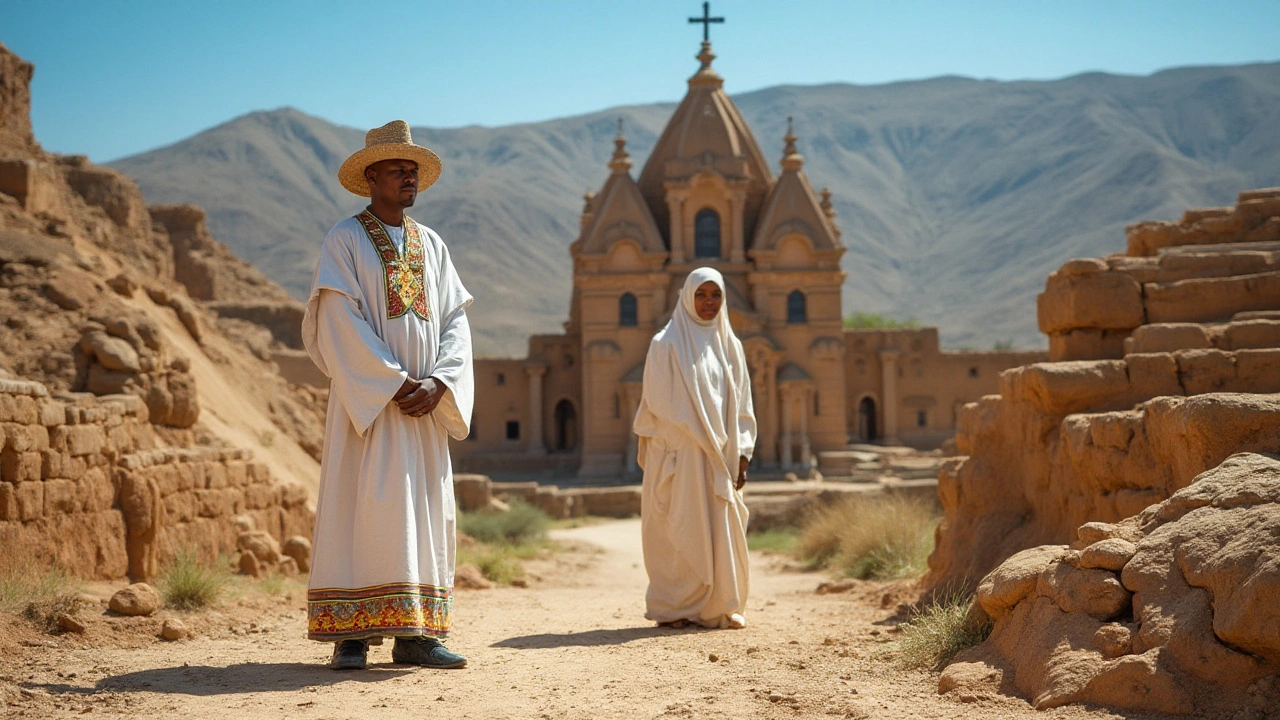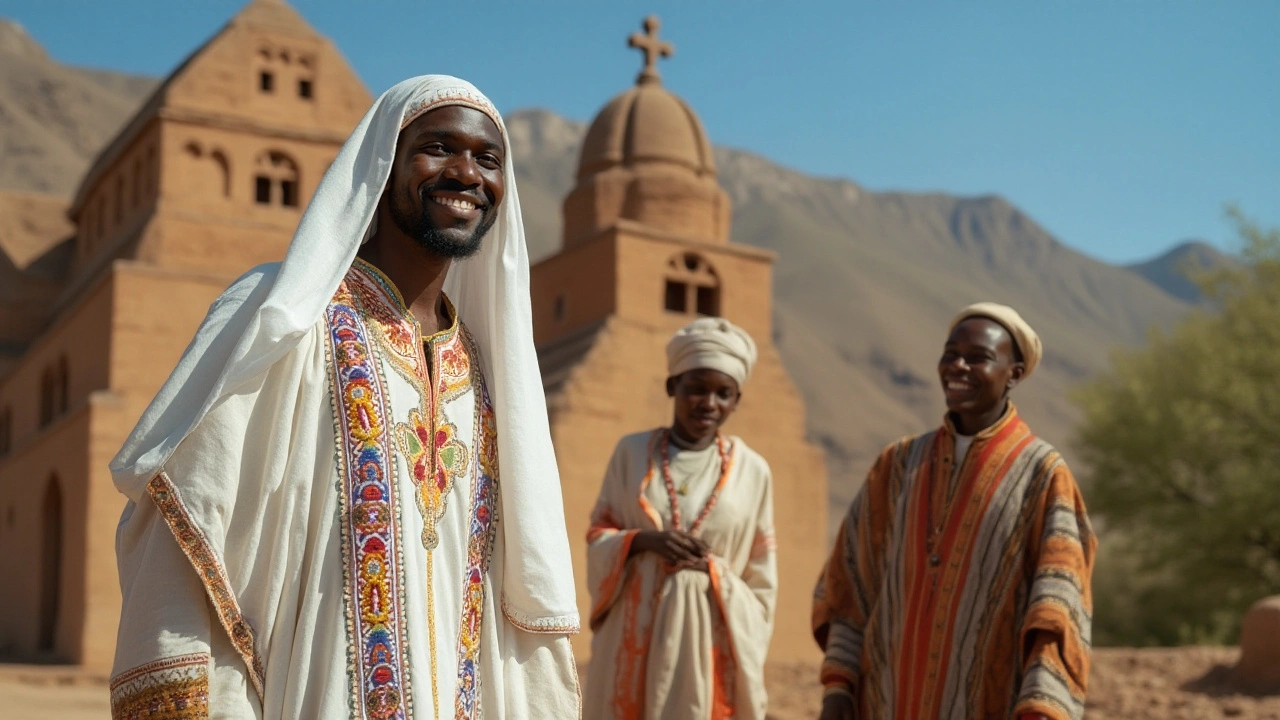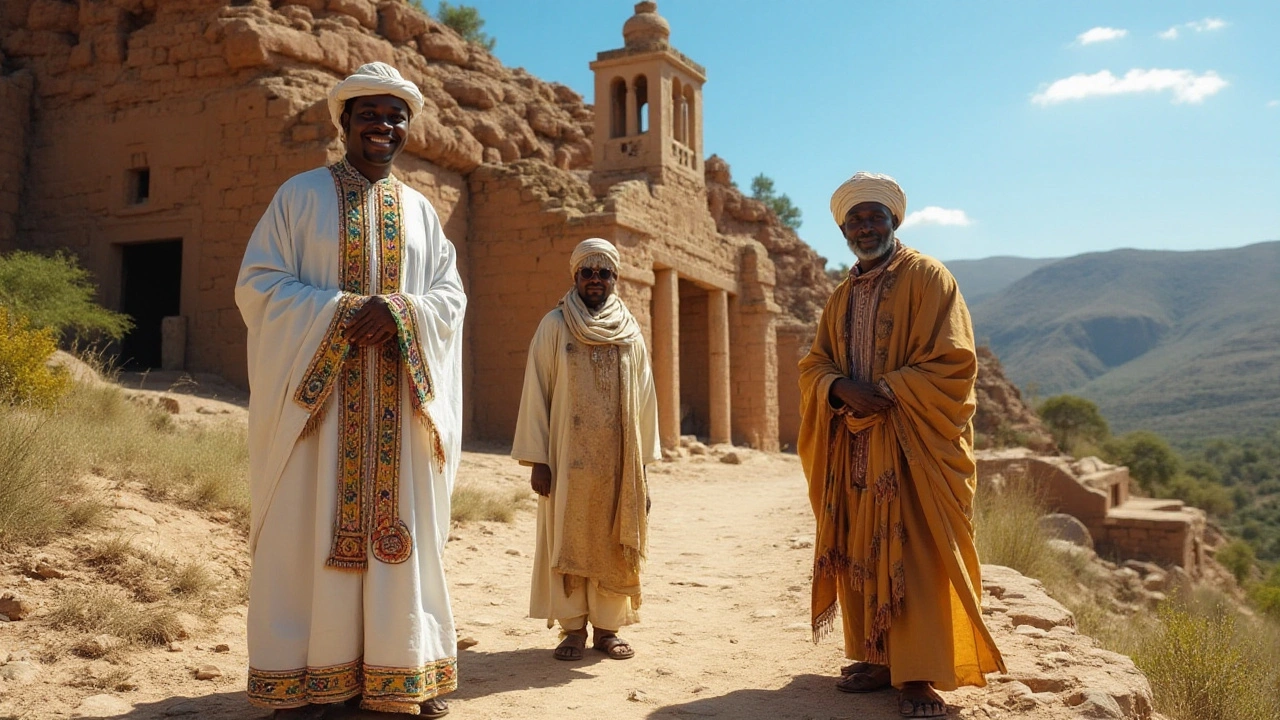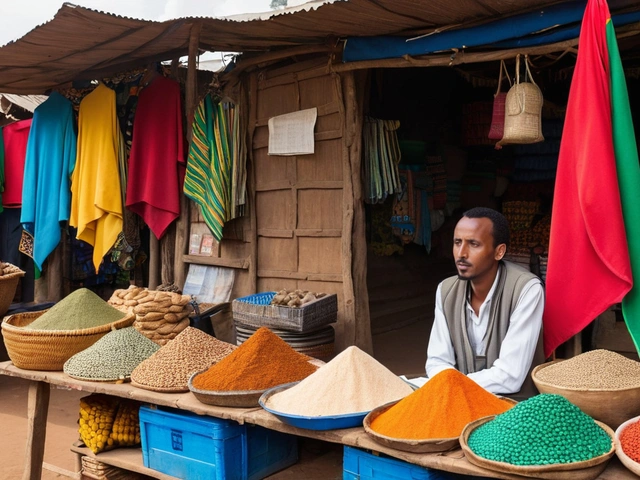Ethiopia stands as a melting pot of various religious traditions, which have significantly influenced its culture and history. Known for being one of the oldest Christian nations in the world, Ethiopia also embraces Islam and Judaism, each playing a vital role in the nation's identity.
Exploring these faiths reveals a tapestry of unique practices and rich traditions that continue to shape the lives of millions. Let’s dive into the spiritual landscape of Ethiopia, starting with the dominant religion of Christianity, followed by Islam, and rounding off with Judaism.
- Christianity in Ethiopia
- Islam in Ethiopia
- Judaism in Ethiopia
- Cultural Significance
- Historical Context
- Interfaith Relations
Christianity in Ethiopia
Christianity holds a unique place in Ethiopia, tracing its roots back to the early 4th century. The Ethiopian Orthodox Tewahedo Church is the oldest and largest branch, boasting more than 36 million followers today. This church has a rich tradition that goes beyond religious practices and influences many aspects of Ethiopian life, including the arts, community customs, and even national holidays.
The Ethiopian Orthodox Church was officially adopted as the state religion during the reign of King Ezana of Aksum around 330 AD, making Ethiopia one of the first regions in the world to embrace Christianity as a state religion. The Church maintains its distinctive Christian traditions like the use of Ge'ez, an ancient Semitic language, in its liturgy.
"Ethiopia shall soon stretch out her hands unto God,"—a verse from Psalms 68:31, often quoted to reflect Ethiopia's deep biblical history.
Many people may not be aware, but the Ark of the Covenant, according to Ethiopian tradition, is housed in the Church of Our Lady Mary of Zion in the city of Aksum. This place is considered so sacred that only one guardian monk is allowed to see the Ark. Whether this claim holds is up for debate, but it speaks volumes about the strong faith and tradition that underpin Ethiopian Christianity.
Churches in Ethiopia are architectural marvels, such as the rock-hewn churches of Lalibela, designated a UNESCO World Heritage Site. These churches were carved out of solid rock in the 12th century and are a testament to the ingenuity and faith of the Ethiopian people. Pilgrimages to these sacred sites are common, with many adherents walking for days to reach them, in an act of faith and devotion.
The Ethiopian Orthodox calendar runs seven years and eight months behind the Gregorian calendar and includes unique religious holidays such as Timkat (Epiphany) and Meskel (Finding of the True Cross). On these days, streets are filled with parades, music, and colorful ceremonies that engage the entire community.
Apart from the Orthodox Church, Protestant Christianity has also made significant inroads. Introduced by missionaries in the 19th century, Protestantism now claims about 20 million followers. Protestant churches are most notably active in social services, from education to healthcare, often complementing government efforts.
Christianity's influence on Ethiopian society is profound, as it is not merely a set of beliefs but an integral part of daily life. Traditional Ethiopian music, dance, and art often reflect Christian themes, creating a spiritual ambiance that users immerse themselves in daily. The magnificent blend of faith and culture makes Ethiopia's Christian landscape truly unique.
Islam in Ethiopia
Islam holds a significant place in Ethiopia's religious landscape, deeply rooted in the nation's history. Muslim communities are mainly concentrated in the eastern and southern regions, with the largest populations in areas like Harar, Somali, and Oromia. Harar, often considered the fourth holiest city in Islam, is home to numerous mosques and shrines, reflecting its rich Islamic heritage.
Islam was introduced to Ethiopia in the 7th century when followers of Prophet Muhammad sought refuge from persecution in Mecca. This event, known as the First Hijra, marked the beginning of Islam in Ethiopia. The Christian King of Aksum provided sanctuary to Muhammad’s followers, setting a tone for a historical relationship between the two religions. Over centuries, Islam has maintained a strong presence, influencing cultural practices, language, and local traditions.
The Ethiopian Muslim community is diverse. Most Ethiopian Muslims belong to the Sunni branch of Islam, following the Shafi'i school of thought. However, other Islamic schools and Sufi traditions also find a place in the Ethiopian religious mosaic. The Sufi orders, in particular, have played a vital role in the spiritual and cultural life of Ethiopian Muslims, emphasizing mysticism and the inward search for God.
Religion intertwines closely with daily life. Many towns and villages witness the call to prayer echoing through the air five times a day, drawing the faithful to prayer. Festivals like Eid al-Fitr and Eid al-Adha are celebrated with great enthusiasm, marked by communal prayers, feasting, and acts of charity. During the holy month of Ramadan, Muslims fast from dawn to dusk, which is a time for reflection, prayer, and fellowship.
The Harari people, known for their distinct cultural identity, are predominantly Muslim and contribute significantly to the Islamic architecture and heritage of the region. The old city of Harar, a UNESCO World Heritage site, is notable for its unique blend of Islamic and local traditions, featuring narrow alleys, vibrant markets, and ancient mosques. The Grand Mosque of Harar, one of the oldest in Africa, stands as a testament to the enduring Islamic presence in Ethiopia.
"Ethiopia is unique in the Muslim world for the deep historical relationships between its Muslim and Christian communities, which go back to the earliest days of Islam," says John Esposito, a professor of International Affairs and Islamic Studies at Georgetown University.
Political and social dynamics have sometimes brought challenges to the Muslim community in Ethiopia. Issues like economic disparities and political representation have sparked discussions and movements within the community, aiming for greater inclusion and equity. Despite these challenges, the resilience of Ethiopian Muslims is evident in their continued dedication to enriching the nation's cultural and religious tapestry.

Judaism in Ethiopia
One of the lesser-known yet profoundly significant religions in Ethiopia is Judaism, practiced by the Beta Israel community, also known as Ethiopian Jews. The roots of the Beta Israel community in the country date back at least 2,500 years, although some legends suggest an even earlier presence. According to these traditions, they claim descent from the Tribe of Dan, one of the Ten Lost Tribes of Israel. The community's strong faith and customs have helped them preserve their identity through centuries of change and adversity.
The Beta Israel community has a unique set of traditions and religious practices. Their holy book, the Orit, includes the first five books of the Hebrew Bible, and they celebrate Jewish holidays such as Passover and Yom Kippur. Unlike other Jewish communities worldwide, Beta Israel also incorporate some additional local practices that are unique to their Ethiopian heritage. For instance, their Sabbath observance has intricate local customs reflecting their deep connection to their environment.
One notable chapter in the history of Ethiopian Judaism is the airlifts named 'Operation Moses' and 'Operation Solomon,' which took place in the 1980s and early 1990s. These operations brought thousands of Ethiopian Jews to Israel, driven by the dream of returning to what they believe is their ancestral homeland. This dramatic migration significantly affected the community structure, but many Beta Israel still remain in Ethiopia, maintaining their traditional way of life.
In the villages where Beta Israel reside, the unique circular synagogues are a reflection of their heritage. Made from locally available materials, these synagogues have a distinctive design that sets them apart from other Jewish places of worship worldwide. These structures are not just religious centers but hubs of community activity, encompassing both spiritual and social functions.
Despite facing various challenges, including socio-political hardships and religious persecution, Beta Israel have shown remarkable resilience. Their determination to maintain their religious identity is evident in their strict observance of dietary laws, use of traditional prayer books, and follow the ancient liturgical calendar. The enduring strength of Ethiopian Jews is a testament to the richness and variety of Ethiopia’s religious tapestry.
Their story is inspiring and serves as an example of how faith and identity can be preserved despite adversity. "Beta Israel are not just an Ethiopian community; they are a living narrative of Jewish history," said Professor Steven Kaplan, an expert in Ethiopian Jewry.
The Beta Israel community's journey continues to intrigue scholars and the broader public, reflecting a blend of historical endurance and contemporary evolution. Their existence provides a window into the diverse world of *Ethiopian religious practices*, contributing significantly to the nation's rich cultural mosaic.
Cultural Significance
In Ethiopia, religion is deeply intertwined with everyday life, shaping not just individual beliefs but also societal norms and cultural traditions. The predominance of Christianity, particularly the Ethiopian Orthodox Church, is especially prominent. This isn’t just about rituals or doctrines; it's a central piece in the cultural mosaic.
Christianity holds a place of historical reverence in Ethiopia, tracing its roots back to the 4th century AD. Today, religious festivals like Timkat (Epiphany) and Meskel (Finding of the True Cross) are national holidays that bring communities together. These festivals are marked by long processions, colorful attire, and ancient rituals. They do more than celebrate religious narratives; they preserve and renew a shared cultural heritage.
Islam also holds a significant place in Ethiopia’s cultural tapestry, with historical records showing its presence since the Prophet Muhammad’s time. Many Ethiopian Muslims participate in annual pilgrimages, fasting during Ramadan, and celebrating Eid with communal prayers and feasts. These practices offer an additional layer of cultural richness, emphasizing values like community support and altruism.
The Jewish community, although smaller, contributes uniquely to Ethiopia's cultural landscape. The Beta Israel, as they are known, have their own customs, holidays, and modes of worship that add another thread to Ethiopia’s diverse quilt. Their traditions around Passover and Sukkot, for example, offer poignant insights into their unique identity.
The interweaving of these religious traditions is evident in Ethiopia's architecture, music, and culinary practices. Churches like the rock-hewn churches of Lalibela are not just places of worship but also UNESCO World Heritage sites that draw visitors from around the globe. Similarly, the Grand Mosque in Harar and the historic synagogues in Gondar bear witness to the rich tapestry of Ethiopia’s religious history.
"In Ethiopia, faith and culture are two sides of the same coin, each enriching the other," says Fisseha Tegegn, a prominent Ethiopian historian.
Religious diversity also drives interfaith dialogue and cooperation, with various religious organizations working together on social issues like poverty alleviation and educational initiatives. This spirit of unity in diversity is a cornerstone of Ethiopia’s societal framework.
In essence, the religious practices in Ethiopia do more than signify individual faith; they are indispensable to the nation's cultural identity. Each belief system, whether practiced by the majority or minority, shares a part in the larger narrative that defines what it means to be Ethiopian.

Historical Context
The history of religion in Ethiopia is a rich tapestry that dates back to ancient times, making it one of the most intriguing aspects of its cultural heritage. Christianity, for instance, was introduced to Ethiopia as early as the 4th century AD. According to historical accounts, King Ezana of the ancient kingdom of Aksum converted to Christianity, influenced by Frumentius, a missionary who later became the first bishop of Aksum. This momentous event marked the beginning of Ethiopia's deep-rooted Christian traditions.
The Ethiopian Orthodox Church, one of the oldest organized Christian bodies in the world, has since been a cornerstone of Ethiopian identity. Its unique practices, such as the observance of the Julian calendar and the celebration of religious festivals like Timkat, have persisted through centuries, blending seamlessly with the nation's culture.
Islam also has a significant historical presence in Ethiopia. The earliest Muslim community outside the Arabian Peninsula took refuge in the ancient kingdom of Aksum during the Prophet Muhammad's lifetime. This migration, known as the First Hijra, is a testament to Ethiopia's longstanding tradition of religious tolerance. Today, Islam is prominently practiced in several regions, including the historic city of Harar, recognized for its ancient mosques and Islamic scholarship.
Judaism has an equally compelling historical narrative in Ethiopia. The Beta Israel or Ethiopian Jews claim descent from the lost Tribe of Dan, one of the Ten Lost Tribes of Israel. Their unique customs and religious practices have been preserved for centuries, despite challenges and isolation. It wasn't until the late 20th century that many Ethiopian Jews emigrated to Israel during operations like Moses and Solomon.
"Ethiopia is not just a cradle of human civilization but also a cradle of diverse religious practices, each shaping the country's history in profound ways." - Dr. Richard Pankhurst, Ethiopian Historian
The influence of these religions is evident not just in spiritual practices but also in art, architecture, and daily life. Magnificent structures like the rock-hewn churches of Lalibela and the mosques of Harar stand as testaments to the architectural ingenuity inspired by faith.
Religious coexistence has been a hallmark of Ethiopia's historical narrative. Various communities have lived in harmony for centuries, fostering a cultural mosaic. This peaceful coexistence is particularly important in today's world, providing valuable lessons on mutual respect and understanding.
The historical context of religion in Ethiopia is as vibrant and complex as the country itself. Whether it's the ancient Christian traditions, the significant early Muslim influence, or the enduring Jewish practices, each religion has left an indelible mark on the nation's history. This blend of faiths has not only shaped Ethiopia's past but continues to define its present and future, making it a fascinating study for anyone interested in religious heritage.
Interfaith Relations
One of the standout features of Ethiopia is the profound and complex interplay between its varied religious communities. Many Ethiopians take pride in the peaceful coexistence of Christianity, Islam, and Judaism within their nation. This mosaic of faiths, each with their own traditions, rituals, and communities, gives Ethiopia a unique spiritual landscape. Constructive dialogue and respect for one another's beliefs have been key to maintaining this harmony. Social events, market days, and even family units often witness a blend of these religions, creating a tapestry of unity amidst diversity.
Historically, Ethiopia has been a shining example of religious tolerance and mutual respect. While there have been moments of tension, these instances are often overshadowed by the rich history of collaboration and peaceful coexistence. For instance, the Muslim-Christian relationship dates back to the 7th century when the Ethiopian Orthodox Christian Kingdom provided asylum to the Prophet Muhammad's followers, long before Islam's reach expanded widely. Recognizing this gesture of hospitality, the Prophet himself instructed Muslims to respect Ethiopia—a sentiment that resonates even today.
Another fascinating aspect of Ethiopia's religious diversity is the vibrant Jewish community known as Beta Israel. Although many members emigrated to Israel during Operation Moses and Operation Solomon in the late 20th century, a significant number remain in Ethiopia, contributing to the rich cultural mosaic. Beta Israel and other communities participate in interfaith dialogues and initiatives, fostering mutual understanding and collaboration. It is common to find various faith-based NGOs working together to address social issues, reflecting their shared values of compassion and service.
‘In Ethiopia, religion is not a barrier but a bridge. It ties us together in a shared history and a hopeful future.’ - Dr. Abiy Ahmed, Prime Minister of Ethiopia
Educational institutions in Ethiopia open doors to students of all religious backgrounds, emphasizing a curriculum that fosters understanding and respect for all faiths. Schools and universities often hold interfaith forums and cultural events celebrating major religious holidays. This inclusivity helps cultivate a sense of mutual respect among the younger generation, equipping them with the perspective needed to sustain this harmonious coexistence.
The government too plays a crucial role in maintaining and promoting religious harmony. By enshrining the freedom of religion in the constitution and implementing policies that prevent discrimination, the Ethiopian administration ensures that all faith communities have the space to thrive and practice their beliefs freely. Mehadas—a celebrated gathering for all religious leaders—held annually, allows leaders to discuss pressing issues and find common ground, further strengthening the nation's interfaith harmony.
While the core of Ethiopian society rests on these harmonious relations, challenges do exist. Urbanization and political pressures sometimes cause friction, yet the enduring spirit of cooperation often prevails. Moreover, local community initiatives and grassroots efforts frequently work to bridge any gaps, reinforcing the foundation of trust and mutual respect that Ethiopia is so well known for. Examples include interfaith health clinics and educational programs, which often receive support from both local leaders and international organizations.

 Starting a Small Business in Ethiopia: Key Steps and Insights
Starting a Small Business in Ethiopia: Key Steps and Insights
 Cost of Living in Ethiopia 2024: Expenses for a Comfortable Lifestyle
Cost of Living in Ethiopia 2024: Expenses for a Comfortable Lifestyle
 Understanding Average Income Levels in Ethiopia: Analysis in USD
Understanding Average Income Levels in Ethiopia: Analysis in USD
 Pharmacist Salary Insights in Ethiopia: 2024 Guide
Pharmacist Salary Insights in Ethiopia: 2024 Guide
 Discovering Ethiopia's Rich Cultural and Natural Treasures
Discovering Ethiopia's Rich Cultural and Natural Treasures
Horace Wormely
August 14, 2024 AT 17:38The article correctly notes that Christianity has been the state religion since the reign of King Ezana, but it should also clarify that the Ethiopian Orthodox Tewahedo Church is distinct from other Oriental Orthodox bodies due to its unique Christological doctrine.
christine mae cotejo
August 23, 2024 AT 23:51Indeed, the tapestry of Ethiopian faith is nothing short of a grand epic, woven over millennia with threads of devotion that shimmer in the sunlight of history. From the moment the Ark of the Covenant was said to be enshrined in Aksum, a sense of sacred destiny has pulsed through the valleys and highlands. The rock‑hewn sanctuaries of Lalibela stand as monuments not merely to architectural prowess, but to a collective yearning for a tangible connection to the divine. Each step of the pilgrim, each candle lit within those stone chambers, reverberates with the whispers of saints long departed. Meanwhile, the minarets of Harar rise like guardians of a legacy that began when early Muslims found refuge under an Aksumite king’s protection. The call to prayer echoing across the desert sands is a reminder that tolerance was not an abstract ideal, but a lived reality. The Beta Israel community, with its circular synagogues, illustrates how Jewish tradition was adapted to the Ethiopian environment, preserving ancient rites while embracing local customs. Their perseverance through the tumult of Operation Moses and Solomon showcases a resilience that defies the hardships of exile. Moreover, the festivals-Timkat's vibrant processions, Eid's communal feasts, and Passover's solemn Seder-illustrate a cultural symphony where each faith contributes its own movement. In the bustling markets of Addis Ababa, one can hear Amharic greetings interspersed with Arabic prayers and Hebrew blessings, a living chorus of interfaith harmony. It is this interweaving that fuels Ethiopia’s unique identity on the world stage, inviting scholars and travelers alike to marvel at its pluralistic spirit. The historical narratives, whether chronicled by medieval hagiographies or modern anthropologists, converge on a central theme: coexistence nurtured by mutual respect. Even in moments of political tension, the underlying fabric remains resilient, much like the ancient stones that have withstood centuries of change. Let us celebrate this mosaic not merely as a relic of the past, but as a blueprint for future societies striving toward peaceful pluralism. In essence, Ethiopia’s religious landscape is an ever‑evolving story of faith, culture, and human endurance, written across both holy sites and everyday life.
Douglas Gnesda
September 2, 2024 AT 06:04From a sociolinguistic perspective, the coexistence of Ge'ez liturgy, Arabic script in Islamic scholarship, and Hebrew liturgical texts exemplifies a remarkable polyglot ecosystem. Demographically, the 2022 census approximates the distribution at 57% Ethiopian Orthodox, 34% Muslim, and 2% Jewish, with the remainder adhering to Protestantism and indigenous beliefs. This stratification influences not only ritual calendars but also socio‑economic networks, especially in regions like Harar where Shafi'i jurisprudence informs trade practices. The interplay of canonical law-Canon Law for the Orthodox, Sharia for Muslims, and Halakha for the Beta Israel-creates a multi‑juridical environment that policymakers must navigate. It's also worth noting that the Ethiopian Ministry of Culture and Tourism leverages these religious sites for heritage tourism, contributing an estimated $350 million to the national GDP annually. Such data underscores the pivotal role of interfaith dynamics in both cultural preservation and economic development.
Abhijit Pimpale
September 11, 2024 AT 12:18The figures you cite are outdated and overlook recent urban migration trends.
Eric DE FONDAUMIERE
September 20, 2024 AT 18:31Yo, this article really shines a light on Ethiopia's rich spiritual vibe! I love how it shows the rock‑hewn churches-so awe‑inspiring. Keep spreading the word, fam!
Pauline Herrin
September 30, 2024 AT 00:44While the enthusiasm is commendable, the narrative would benefit from a more rigorous citation of primary sources, particularly concerning the claimed custodianship of the Ark of the Covenant.
pradeep kumar
October 9, 2024 AT 06:58The piece glosses over systemic disparities faced by Ethiopian Muslims, presenting an overly romanticized picture.
love monster
October 18, 2024 AT 13:11It's essential to acknowledge those challenges, but also to highlight grassroots initiatives-like interfaith health clinics-that demonstrate how community‑level collaboration can mitigate inequities and foster resilience.
Christian Barthelt
October 27, 2024 AT 18:24Contrary to the article's celebratory tone, the historical record shows that the First Hijra was driven more by geopolitical necessity than altruistic hospitality, and subsequent interfaith dynamics have been far more contentious than portrayed.